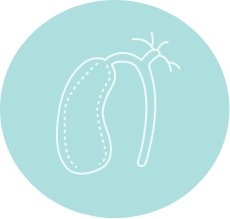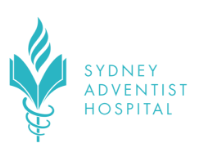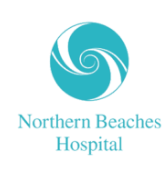General information for new patients of Dr Le Page
What is laparoscopic or keyhole surgery and why should i choose a Surgeon specialising in this?
Laparoscopic surgery is a surgery technique specifically developed mainly after 1990 which allows surgery to be undertaken through tiny skin incisions rather than long wounds. The advantages generally are:
- Much smaller scars
- Less post surgery pain
- An overall better outcome and recovery
- Shorter hospital stay
- Less chance of wound infection
For example, rather than undertake a gastric bypass operation through a 20-30cm incision extending from your chest bone down to below your belly button, the same operation can done through 4-5 keyhole incisions, around 0.5-1cm each. Special “ports” are placed through these keyhole incisions and allow special surgery instruments (about the size of a chopstick) to be passed down the port and to hold, dissect, staple etc.. Inside the abdomen. The surgeon views the images on a television monitor.




Whilst this approach should be considered for all types of operations, some operations may still be best done “open” and will be judged by your surgeon. An open honest appraisal of this decision should be provided by your surgeon with your best interests at heart.
It took many surgeons many decades to refine the equipment, tools and techniques to make this surgery the preferred approach it is today. This requires special surgery training and also ongoing frequent performance to maintain skills. You should choose a surgeon who can offer this experience and skill.
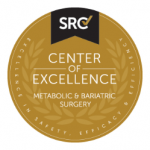





Where can I have a consultation with Dr Phil Le Page?
- Northern beaches of Sydney – in the Northern Beaches hospital
- Upper north shore of Sydney – opposite the Sydney Adventist (san) hospital
- Concord hospital
- Western sydney – campbelltown
- Goulburn – call (02) 4816 1500 only for this location
Where can I have my surgery with Dr Le Page?
When can I return to work after my surgery?
This is dependant on:
- The type of surgery and anaesthetic
- What you work involves
- If you have to travel for work
- Any use of strong pain medications after surgery
- Whether light duties can be offered by your employer
Some examples are:
- Following a gastroscopy with sedation, the limiting factor is any lag over effect of the anaesthetic for the medication to be reliably out of your system, so a period of 24 hours is usually sufficient.
- Following a keyhole gallbladder operation, it would likely be ok to work from home after 5 days or so (when you shouldn’t need any further strong opiod pain relief), although if you have to drive to work it may be 1-2 weeks
- Following a laparoscopic sleeve gastrectomy, it would likely be ok to work from home after a week or so (when you shouldn’t need any further strong opiod pain relief), although if you have to drive to work it may be 1-2 weeks. You still must be able to give yourself adequate attention particular as regards to ensuring you remember to keep yourself regularly hydrated.
- Following a keyhole hernia operation, it should be clear to attend an office after a week or so, although a job with heavy physical work may need 4-6 weeks to allow adequate healing at the hernia site.
- Following an open cancer operation, it would likely be many weeks until discomfort has settled, a good routine with eating has been established and your energy levels have returned.
Your surgeon will give you the recommendation for your particular situation and this may change depending on how you feel after the procedure. You should also check in with your employer and most importantly, keep yourself and those around you safe.
When can I start driving after my surgery?
The priority is to keep yourself and others safe on the roads, whilst also ensuring no discomfort or pressure is put on the healing wounds. This is mostly dependant on:
- The type of surgery and anaesthetic
- If you have to travel for work
- Any use of strong pain medications after surgery
Some examples are:
- Following a gastroscopy with sedation, the limiting factor is any lag over effect of the anaesthetic for the medication to be reliably out of your system, so a period of 24 hours is usually sufficient to be safe on the road.
- Following a keyhole gallbladder operation, it would likely be ok to drive after a week or so (when you shouldn’t need any further strong opiod pain relief and the wounds are mostly healed).
- Following an open cancer operation, it may be closer to a month.
Your surgeon will give you the recommendation for your particular situation and this may change depending on how you feel after the procedure. You should test yourself sitting in the car first, then in a quiet safe location. You should also check in with your motor insurance company. Most importantly, keep yourself and those around you safe.
Can I choose my date for surgery?
Dr Le Page will always try to make available a time period of your preference. It may also be that Dr Le Page advises you that an early procedure is necessary on clinical grounds. Elective hospital operating lists are allocated and options exist for different days of the week and different locations for your convenience. Those with private insurance can choose their preferred date. Those under Medicare only will be allocated by the hospital according to the clinical urgency as determined by Dr Le Page and the waitlist categories.
General information for current patients of Dr Le Page
When do I need to see Dr Le Page after I have had my surgery?
This depends on what you are having done. Usually this would be between 2-4 weeks after surgery. Usually this is in person however this can be done by telehealth. You will be advised at the time of your procedure when to follow-up and we will book that in for you and advise you of the date and a time. This can be changed if necessary, just be in touch.
What do I do with my wound dressings after surgery?
You will be advised by dr le page and hospital ward nurses. Usually dressings should stay for about 10 days. They are usually waterproof and so a shower is possible with them. Sometimes they start to peel before the 10 days and they can even be removed from about a week after surgery (you can always put a new one on until your review). Stitches are almost always dissolvable and buried beneath the skin (so you won’t see these). If your follow-up is in person at around 2 weeks you may leave these for dr le page to remove.
When do I stop eating before my surgery?
The hospital will contact you the day before surgery (sometimes late) to advise of this time. Usually it is midnight before your surgery (or at least 6 hours if it is booked late in the day).
When do I turn up at the hospital for my surgery?
The hospital will contact you the day before surgery (sometimes late) to advise of this time. You should follow their instructions (rather than contact dr le page’s practice) as they are co-ordinating all patients attending the hospital that day.
Do I take my usual medications on the day of my surgery?
This depends on the type of medication and how necessary it is. The most important medications to decide on are blood thinning medications and diabetic medications.
- blood thinning medications – you should already have had a plan to cease these a numbers of day prior, as advised by dr le page, the hospital or anaeastehtist. They should also not be taken on the day of the procedure.
- diabetic medications – this depends on the type and some should have been stopped a few days prior (eg. Jardiamet) or reduced dosage the night before. On the day, they should not be taken (the hospital will check you blood sugar when you turn up and address this if necessary)
- other medications:
- important medications should be taken with sip of water in the am on the day of surgery (unless advised otherwise) – examples are blood pressure medications, b-blockers or anti-depressants.
- non-essential medications can simply be withheld – eg. Cholesterol medication.
Common questions about your condition
What is weight loss surgery (or bariatric surgery)?
This is surgery performed for an eligible person to induce weight loss, in the interests of their health. It was first performed in the first half on the 1900’s but only in the last few decades has it become commonly performed given the safety of the keyhole techniques, and also the scientific data showing its benefits for a person’s health, life expectancy and daily wellbeing. Different technqiues of the surgery are available and need to be explained by a bariatric surgery specialist.
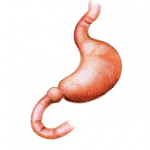

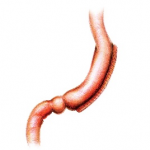

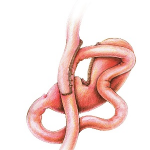

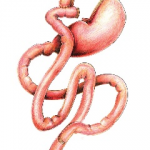

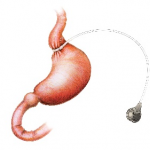

For further information, please see the menu bar “WEIGHT LOSS SURGERY”.
What are gallstones?
These can range from fine particles like sand, to pebbles or even large like the size of a golf ball. They form within the gall bladder which is in the top right hand side of your abdomen.these are abnormal, however are common and usually only need removal if they are causing symptoms.
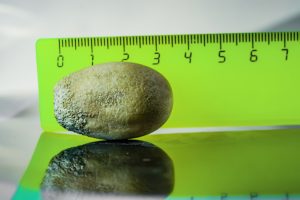

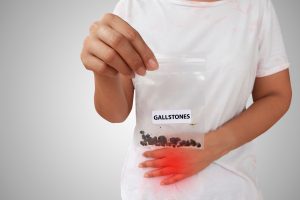

For further information, please see the menu bar ” GALLSTONES”.
What is a hernia?
This comprises:
- A weakness/defect in your abdominal wall (which ‘holds’ the contents of your abdomen inside and protects them)
- The actual content passing through this weakness (usually either fat or bowel)
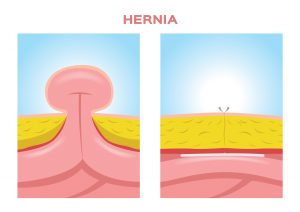

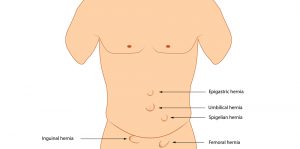

For further information, please see the menu bar “HERNIA”.
What is reflux and do i have it because i have a hiatus hernia?
Relux is where some of the contents of your stomach (either acid juices, bile or undigested food) intermittantly pass back up into your oesophagus in your chest (foodpipe), rather than staying bloew your diaphragm in your abdomen and only passing through your bowel. This can occur with a structually normal stomach anatomy (and just a weak ‘anti-reflux valve’) or when there is a hiatus hernia (where the stomach has partially moved up into your chest). A hiatus hernia can also be present without causing reflux (either no symptoms, or other symptoms like troubles swallowing or chest pain)
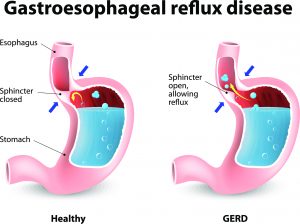

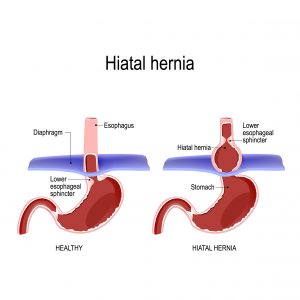

For further information, please see the menu bar “REFLUX/HIATUS HERNIA”.
I have just been diagnosed with stomach or oesophagus cancer, where exactly inside me is this?
The oesophagus is the ‘foodpipe’ tube that links your mouth with your stomach and passes down the chest. Food enters the stomach in the abdomen where it get luclhes up over an hour or more in the process called digestion, prior to passing into your bowels.
Cancer in your oesophagus can occur in the oesophagus anywhere between the lower part of your neck and the lower part of your chest. Stomach cancer can occur in any part of the stomach. A cancer may also occur at the junction. The location of the cancer determines what type of surgery will be necessary if it can be removed.
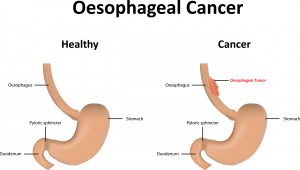

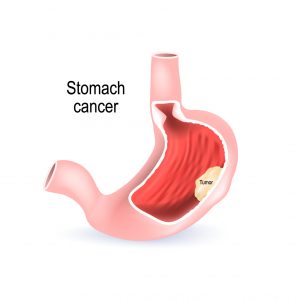

For further information, please see the menu bar “CANCER (OESOPHAGUS/STOMACH)”.
What is pancreatitis and why did I get this?
The pancreas is in the top left of your abdomen and is an organ that can become inflammed (just like the tonsils can become inflammed in a process called tonsilitis). This will initially be a sudden pain and there may be an obvious cause, such as excessive alcohol consumption, or an unexpected cause such as gallstones or something rarer.
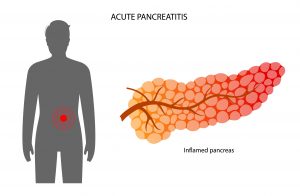

For further information, please see the menu bar “GASTRO-INTESTINAL SURGERY”.
Why have I been told I need a gastroscopy or colonoscopy?
This will usually be because you have symptoms conerning for a problem which can only be seen by direct visualisation through a camera on the inside of your gastro-intestinal tract. It may also be because you have tested positive to the screening stool test sent in the post to those aged between 50 and 74, or you have a significant family history.
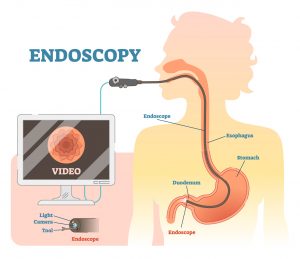

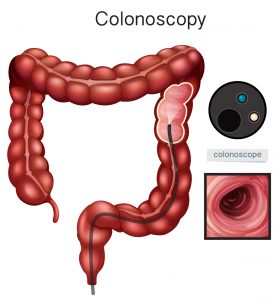

For further information, please see the menu bar “ENDOSCOPY/COLONOSCOPY”.
What are haemorrhoids?
Everyone has small blood vessels just inside their anus. If these become swollen and large they are known as haemorrhoids. There may not be noticeable if they are only on the ‘inside’ (but cause a passage of blood) or protrude as a lump which you may notice on the outside.
For further information, please see our menu bar “GENERAL SURGERY”.

